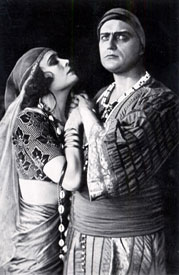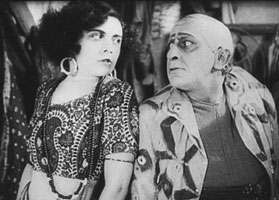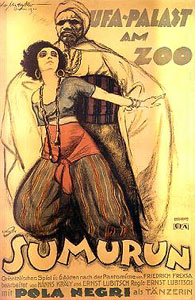 Based on a trivial stage pantomime, Sumurun (1920) is an Arabian adventure, with Ernst Lubitsch appearing as the hunchback in love with & jealous of a beauty who barely tolerates him.
Based on a trivial stage pantomime, Sumurun (1920) is an Arabian adventure, with Ernst Lubitsch appearing as the hunchback in love with & jealous of a beauty who barely tolerates him.
For a long time only the brutally shortened American release of this silent film, distributed as One Arabian Night (1921), was available. The restoration, forty minutes longer, was at long last released in 2006.
The heroine or perhaps anti-heroine Yannaia is played by Pola Negri, who had already made the role famous performing it on the Polish pantomime stage.
While performing in the pantomime, she was discovered by Max Reinhardt who was a mentor to Ernst Lubitsch. Reinhardt brought her to Germany, where he re-launched the pantomime on the stage, with Lubitsch for the first time playing the clown.
 Yannaia has dreams of entering a wealthy sheikh's harem, any wealthy sheike will do. She relies on a slave trader (Paul Biensfeldt) to sell her to a nice man. How dumb was that! And the slave trader is comic relief, because what's funnier than slavery. Yannaia has dreams of entering a wealthy sheikh's harem, any wealthy sheike will do. She relies on a slave trader (Paul Biensfeldt) to sell her to a nice man. How dumb was that! And the slave trader is comic relief, because what's funnier than slavery.
In the film's schizophrenic or idiotic viewpoint, harems are generally like happy schoolgirls' holidays with lots of shopping, until the sheikkh (Paul Wegener, best remembered as Der Golem, 1920) arrives, when it becomes more about threat of rape & murder.
The sheikh's favorite has been Zuleika aka Sumurun (Swedish beauty Jenny Hasselqvis). But she pursued an illicit affair with a merchant (Harry Liedtke), was detected, & nearly killed, except that a new beauty arrives in the nick of time to simply replace her. Yannaia, being a clueless femme fatale, mistakenly thinks this is her lucky break.
Soap opera antics build & build in a lighthearted silly manner, never credible, then out of the blue there's a big tragedy played out at the end, ineffective because the tone of the film doesn't support taking it seriously at practically the last minute, with troublemaking selfishly ignorant Yannaia reforming too late to be much help to anyone or anything.
The sets inspired by the Alhambra are frequently beautiful & cinematography is interesting for the era. The costumes are colorful, with a couple pleasing dance sequences to show off Pola Negri's dance skills.
 But the story's merely ridiculous & just not worth telling, with harem life re-imagined way too childishly. But the story's merely ridiculous & just not worth telling, with harem life re-imagined way too childishly.
The film overall is boring as all get-out, too long by half (it's clear why the 1921 America distributor clipped out forty minutes, but the editing would've had to have begun with the script before shooting began).
The film's primary saving grace is not Negri's admitted beauty, but, rather, Lubitsch himself, in his last screen role, overacting gloriously as the lovelorn hunchback clown who never gives up on the relentlessly misguided femme fatale. Lubitsch has a delightfully over-the-top scene when he takes a potion that induces a coma, & takes his bloody sweet time "dying."
But Mary Pickford liked this film & longed to be presented in some film as well as were Jenny Hasselqvis & Paula Negri. WIth Pickford's influence, Lubitsch was hired in Hollywood, & brought Paula Negri with him to America. With Pickford starring he would make one of her best films, Rosita (1923) & with Negri in Hollywood, Forbidden Paradise (1924).
This one's for silent film fanatics only. Viewers who like silent films only when they're great are much less likely to find it entertaining.
copyright © by Paghat the Ratgirl
|

